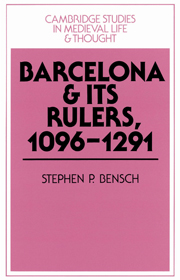Book contents
- Frontmatter
- Contents
- List of figures
- List of maps
- List of tables
- Preface
- List of abbreviations
- Introduction
- 1 The city and its region
- 2 The city and its lord
- 3 An aborted take-off: the urban economy in crisis, 1090–1140
- 4 Urban society in transition
- 5 The patriciate in gestation, 1140–1220
- 6 Family structure and the devolution of property
- 7 Consolidation and conflict: patrician power and Mediterranean expansion, 1220–1291
- 8 Patrician continuity and family identity
- Conclusion
- Appendix 1 Vicars of Barcelona
- Appendix 2 Bailiffs of Barcelona
- Appendix 3 Coinages and exchange values
- Appendix 4 Select documents
- Appendix 5 Select genealogies
- Bibliography
- Index
- Cambridge studies in medieval life and thought
3 - An aborted take-off: the urban economy in crisis, 1090–1140
Published online by Cambridge University Press: 08 December 2009
- Frontmatter
- Contents
- List of figures
- List of maps
- List of tables
- Preface
- List of abbreviations
- Introduction
- 1 The city and its region
- 2 The city and its lord
- 3 An aborted take-off: the urban economy in crisis, 1090–1140
- 4 Urban society in transition
- 5 The patriciate in gestation, 1140–1220
- 6 Family structure and the devolution of property
- 7 Consolidation and conflict: patrician power and Mediterranean expansion, 1220–1291
- 8 Patrician continuity and family identity
- Conclusion
- Appendix 1 Vicars of Barcelona
- Appendix 2 Bailiffs of Barcelona
- Appendix 3 Coinages and exchange values
- Appendix 4 Select documents
- Appendix 5 Select genealogies
- Bibliography
- Index
- Cambridge studies in medieval life and thought
Summary
The economic mechanisms triggering and sustaining the medieval urban revival have long fascinated historians and stimulated considerable debate. Few scholars, however, have managed to set the agenda for discussion in their field as decisively as the great Belgian historian, Henri Pirenne. After sweeping aside previous legal and institutional explanations on urban origins in a brilliant review article, he went on to present a classic and elegantly simple solution to the problem: the early growth of towns depended directly on the revival of long-distance trade, already evident in the tenth century. The seductive power of his argument lay in its ability to account for the emergence of a commercial civilization, which he believed lay at the heart of medieval towns, without reference to the overwhelmingly agricultural, “feudal” world of the early Middle Ages. Because long-distance trade was supposedly generated in complete isolation from the villages, castles, and brutal lords that dominated the countryside, merchants injected a vital, totally new force into the moribund European economy. This explanation reassured advocates of nineteenth-century liberalism that the origins of the middle class had not been tainted with any unpleasant association with the aristocratic, privileged, and “feudal” values in early medieval society. Economically, Pirenne argued for an immaculate conception of the bourgeoisie.
The considerable body of literature that has arisen in response to these ideas has generally made the birth of medieval towns a painfully slow delivery.
- Type
- Chapter
- Information
- Barcelona and its Rulers, 1096–1291 , pp. 85 - 121Publisher: Cambridge University PressPrint publication year: 1995



